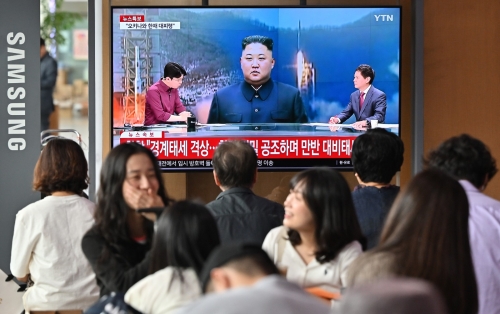'Boy who cried wolf': Seoul residents panic after false rocket alarm
AFP | Seoul
The Daily Tribune – www.newsofbahrain.com
An emergency evacuation alert sent in error across Seoul over a North Korean rocket launch triggered widespread panic on Wednesday, crashing internet services and raising fears the government could not be trusted to handle a real crisis.
The alert, sent at 6:41 am local time to all mobile phones in Seoul, said: "Citizens, please prepare to evacuate and allow children and the elderly to evacuate first."
The message did not specify why residents should evacuate or explain where they should go -- Seoul has long had a network of underground bomb shelters, but they have not been used in emergencies in living memory.
Naver, South Korea's largest internet portal, told AFP its network went down for around five minutes due to the excess traffic sparked by the alert.
After around 20 minutes of confusion, the government retracted the alert.
"We inform you that the alarm sent at 0641 was incorrectly issued," a second alert said.
The retraction prompted anger and frustration, including calls on social media for Seoul Mayor Oh Se-hoon to resign.
"I was taking my two young children to a basement parking lot as advised, in shock," a 37-year-old father who asked to be identified by his surname Yoon, told AFP.
But the correction left him "speechless and outraged", he said.
"Now no one is going to believe a real alarm, just like in the fable about the boy who cried wolf."
The alert was triggered after North Korea launched a rocket carrying a military spy satellite, which crashed into the sea.
But it flew over waters west of the peninsula and not the Seoul metro area, the South Korean military later confirmed.
"It was a space launch out over the ocean," tweeted Jeffrey Lewis, a non-proliferation expert at the Middlebury Institute of International Studies.
"It's like if Japan issued shelter in place warnings every time South Korea did a space launch."
But the authorities in Seoul defended the alert.
As North Korea had launched the rocket to the south, the city government "judged that immediate action was necessary", Mayor Oh said in a press conference.
"This emergency text may have been an overreaction but... there can be no compromise on safety."
Oh said the city would further refine its warning system to avoid public confusion and issue appropriate guidance.
- 'I almost fainted' -
On Twitter, many South Koreans expressed frustration over the poor messaging from the government.
"They didn't tell us why we needed to evacuate, nor did they tell us where we needed to go," wrote user @duckdo_1226.
"I think I'll just end up being killed if a real war breaks out."
Another Seoul resident @pedestrian_1234 tweeted that the evacuation order triggered serious panic.
"I almost fainted because the alert text told us to evacuate without giving information that's actually necessary," they wrote.
"There was a voice announcement outside that I could not even hear, and my hands were trembling. I had to search Twitter to get the information I needed."
The Korean War of 1950-1953 ended with an armistice, not a peace treaty, and the North and the South remain technically at war.
All able-bodied South Korean men are required to serve 18 months of military service.
The alert fiasco speaks to a constant security problem facing South Korea, Minseon Ku, a political science scholar at Ohio State University, told AFP.
It was "unfortunate because given that South Korea is technically in a war at this very moment, it demonstrated potential civil security loophole that could pose real and greater risk if left unaddressed," she said.
"Hopefully this snafu will serve as a timely reminder for local and national governments that a strong and reliable civil security trumps all other security considerations."
US-based analyst Ankit Panda said the mistake should prompt an investigation and review of South Korea's standard operating procedures for missile events.
"False warnings can be especially dangerous in a crisis, but they undermine public trust during peacetime as well," he told AFP.
Related Posts

